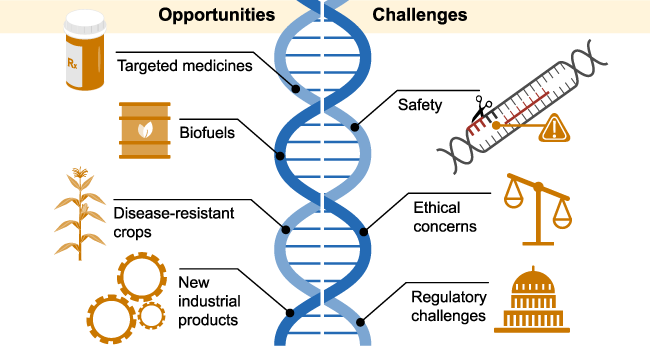Genome-Editing Lab in Haryana | 24 Apr 2025
Why in News?
The Union Minister for Agriculture and Farmers’ Welfare inaugurated a genome-editing laboratory at the Indian Council of Agricultural Research (ICAR)-Indian Institute of Wheat and Barley Research (IIWBR), Haryana.
- Funded under an ICAR scheme, the laboratory aims to leverage modern genomic tools to enhance desirable traits for improved crop adaptation and enriched grain quality.
Key Points
- Appreciation for Climate-Resilient Varieties:
- Farmers appreciated the scientists for providing climate-resilient wheat varieties that could tolerate day-time temperature fluctuations, especially in February and March.
- These climate resilient wheat varieties include Karan Vandana (DBW-187), MACS 6478, and Pusa Yashasvi.
- They expressed satisfaction with the reduced input costs, as disease-resistant varieties eliminated the need for fungicide sprays.
- Farmers appreciated the scientists for providing climate-resilient wheat varieties that could tolerate day-time temperature fluctuations, especially in February and March.
- Interest in New Barley Varieties:
- Some farmers showed interest in hull-less barley varieties, particularly DWRB 223, which had been recently released.
- DWRB-223 offers a high yield of 42.9 quintals/ha and 11.7% protein.
- Its husk-free grain makes it ideal for direct consumption and health food applications.
- Some farmers showed interest in hull-less barley varieties, particularly DWRB 223, which had been recently released.
- Emphasis on Lab-to-Land Approach:
- The Minister emphasised the importance of connecting scientific research with grassroots farming through the ‘lab to land’ approach.
- He stressed that agricultural innovations from laboratories must reach farmers to ensure real-world impact and adoption.
Genome Editing
- Genome editing (also called gene editing) is a group of technologies that give scientists the ability to change an organism's Deoxy-Ribonucleic Acid (DNA).
- These technologies allow genetic material to be added, removed, or altered at particular locations in the genome.
- Advanced research has allowed scientists to develop the highly effective Clustered Regularly Interspaced Palindromic Repeat (CRISPR) -associated proteins based systems. This system allows for targeted intervention at the genome sequence.
- This tool has opened up various possibilities in plant breeding. Using this tool, agricultural scientists can now edit the genome to insert specific traits in the gene sequence.
Indian Institute of Wheat and Barley Research (IIWBR)
- About:
- IIWBR was established in 2014, following the upgradation of the Directorate of Wheat Research.
- It is a premier ICAR-affiliated institute located in Karnal, Haryana.
- It serves as a national hub for research and development in wheat and barley.
- Core Focus:
- IIWBR concentrates on enhancing the productivity of wheat and barley through scientific innovation and field-level interventions.
- The institute aims to make India a global leader in wheat production while ensuring national food security.
- Major Activities:
- It coordinates the All India Coordinated Research Project on Wheat and Barley (AICRP).
- Its key activities include:
- Varietal improvement through breeding and genetics.
- Resource management to enhance efficiency and sustainability.
- Crop protection strategies to combat diseases and pests.

